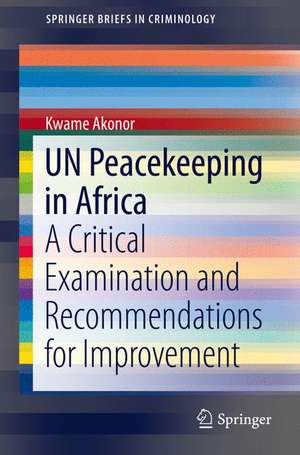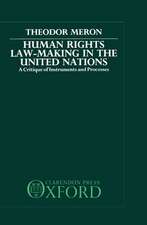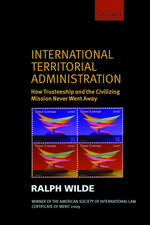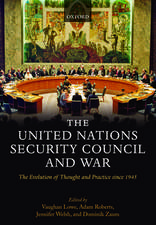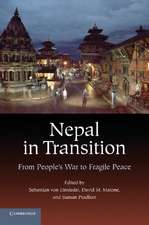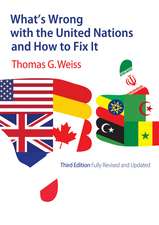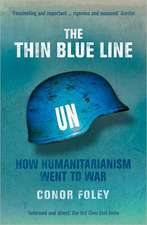UN Peacekeeping in Africa: A Critical Examination and Recommendations for Improvement: SpringerBriefs in Criminology
Autor Kwame Akonoren Limba Engleză Paperback – 23 noi 2016
Although instances of abuse are not widespread and are certainly not isolated to Africa, this work focuses on Africa because there is a high concentration of UN Peacekeepers there, and lessons learned can be applied to other regions. The instances of abuse cover serious crimes including sexual abuse and exploitation, child and arms trafficking, and corruption, all of some of the most vulnerable populations in the world at the time. Although these instances are not extensive, they remain a fundamental problem because there is no existing mechanism for prosecution in the international area: it is only the troops’ home country, not the UN, who has the right to exercise criminal jurisdiction. The also undermine the good work that UN Peacekeepers are doing all over the world.
This work is concerned with highlighting why these instances occur, and why specific forms of abuse are more prevalent than others. It also discusses how to prevent abuse and violations from happening in the first place, and creating a culture of change and accountability. Finally, taking into account cultural and legal systems from troops’ home countries, the author considers the ways that local rules can be aligned with international standards. In will be ofinterest to researchers in Criminology and Criminal Justice, International Relations, Sociology and Demography, Public Health, Comparative Law, and other related disciplines.
Din seria SpringerBriefs in Criminology
-
 Preț: 356.08 lei
Preț: 356.08 lei -
 Preț: 196.15 lei
Preț: 196.15 lei -
 Preț: 175.58 lei
Preț: 175.58 lei -
 Preț: 377.57 lei
Preț: 377.57 lei -
 Preț: 374.30 lei
Preț: 374.30 lei -
 Preț: 374.30 lei
Preț: 374.30 lei -
 Preț: 374.85 lei
Preț: 374.85 lei -
 Preț: 378.12 lei
Preț: 378.12 lei -
 Preț: 445.49 lei
Preț: 445.49 lei -
 Preț: 374.85 lei
Preț: 374.85 lei -
 Preț: 380.07 lei
Preț: 380.07 lei -
 Preț: 173.25 lei
Preț: 173.25 lei -
 Preț: 378.12 lei
Preț: 378.12 lei -
 Preț: 411.93 lei
Preț: 411.93 lei -
 Preț: 378.54 lei
Preț: 378.54 lei -
 Preț: 372.10 lei
Preț: 372.10 lei -
 Preț: 375.23 lei
Preț: 375.23 lei -
 Preț: 375.45 lei
Preț: 375.45 lei -
 Preț: 375.23 lei
Preț: 375.23 lei -
 Preț: 379.09 lei
Preț: 379.09 lei -
 Preț: 375.07 lei
Preț: 375.07 lei -
 Preț: 343.72 lei
Preț: 343.72 lei -
 Preț: 409.25 lei
Preț: 409.25 lei -
 Preț: 377.35 lei
Preț: 377.35 lei -
 Preț: 376.96 lei
Preț: 376.96 lei -
 Preț: 443.00 lei
Preț: 443.00 lei -
 Preț: 375.07 lei
Preț: 375.07 lei -
 Preț: 378.92 lei
Preț: 378.92 lei -
 Preț: 375.07 lei
Preț: 375.07 lei -
 Preț: 377.57 lei
Preț: 377.57 lei -
 Preț: 376.59 lei
Preț: 376.59 lei -
 Preț: 355.07 lei
Preț: 355.07 lei -
 Preț: 376.43 lei
Preț: 376.43 lei -
 Preț: 376.22 lei
Preț: 376.22 lei -
 Preț: 378.71 lei
Preț: 378.71 lei -
 Preț: 352.97 lei
Preț: 352.97 lei -
 Preț: 374.46 lei
Preț: 374.46 lei -
 Preț: 374.30 lei
Preț: 374.30 lei -
 Preț: 476.79 lei
Preț: 476.79 lei -
 Preț: 376.80 lei
Preț: 376.80 lei -
 Preț: 376.43 lei
Preț: 376.43 lei -
 Preț: 475.83 lei
Preț: 475.83 lei -
 Preț: 411.54 lei
Preț: 411.54 lei -
 Preț: 478.33 lei
Preț: 478.33 lei - 15%
 Preț: 460.57 lei
Preț: 460.57 lei -
 Preț: 413.07 lei
Preț: 413.07 lei -
 Preț: 375.62 lei
Preț: 375.62 lei -
 Preț: 378.71 lei
Preț: 378.71 lei -
 Preț: 410.39 lei
Preț: 410.39 lei -
 Preț: 375.07 lei
Preț: 375.07 lei
Preț: 410.55 lei
Nou
Puncte Express: 616
Preț estimativ în valută:
78.56€ • 85.60$ • 66.20£
78.56€ • 85.60$ • 66.20£
Carte tipărită la comandă
Livrare economică 23 aprilie-07 mai
Preluare comenzi: 021 569.72.76
Specificații
ISBN-13: 9783319391601
ISBN-10: 3319391607
Pagini: 105
Ilustrații: XI, 96 p. 4 illus., 2 illus. in color.
Dimensiuni: 155 x 235 x 6 mm
Greutate: 0.16 kg
Ediția:1st ed. 2017
Editura: Springer International Publishing
Colecția Springer
Seria SpringerBriefs in Criminology
Locul publicării:Cham, Switzerland
ISBN-10: 3319391607
Pagini: 105
Ilustrații: XI, 96 p. 4 illus., 2 illus. in color.
Dimensiuni: 155 x 235 x 6 mm
Greutate: 0.16 kg
Ediția:1st ed. 2017
Editura: Springer International Publishing
Colecția Springer
Seria SpringerBriefs in Criminology
Locul publicării:Cham, Switzerland
Cuprins
Chapter 1: Introduction and Justification for Research.- Chapter 2: UN Peace Operations in Africa: Yesterday, Today and Tomorrow.- Chapter 3: The Dark Side of UN Peacekeeping: Abuses and Violations in Africa.- Chapter 4: Responses to Peacekeeping Misconduct.- Chapter 5: Analysis and Implications to Broader Issues.
Notă biografică
Dr. Kwame Akonor (PhD, City University of New York) is director of the African Development Institute, a New York based think tank that advocates self-reliant and endogenous development policies for Africa. ADI has a consultative status with the United Nations Economic and Social Council. He is also a tenured Professor of International Relations and Human Rights at Seton Hall University (NJ), and Director of the University's Africana Studies Center. Dr. Akonor is author of several articles and two books: African Economic Institutions and Africa and IMF Conditionality, both published by Routledge Press. Dr. Akonor is from Ghana.
Caracteristici
Examines crimes committed by UN Peacekeepers in Africa Analyzes why certain types of crime are more prevalent than others Presents cultural and policy recommendations for improvement
